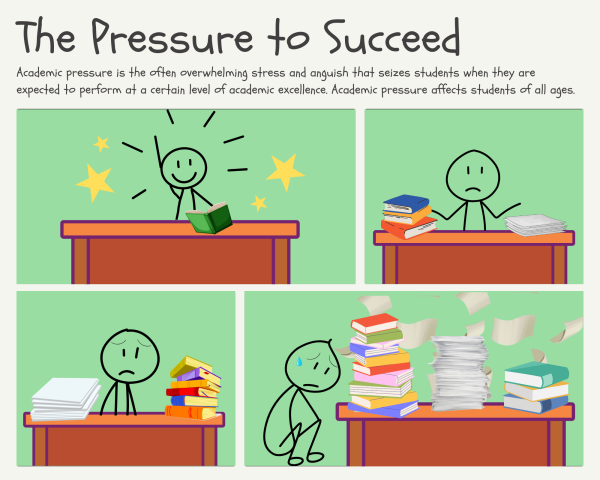
Student feeling pressure to succeed. Photo by Charlie.
From a young age children are always taught to try their best and aim high. Parents and educators are the main people who encourage this habit, some using a reward system or even a small punishment. As time goes on this habit can become something called academic pressure.
Academic pressure is the often overwhelming stress and anguish that seizes students when they are expected to perform at a certain level of academic excellence. As of September 10, 2024, it was reported that 94% of American college students, 75% of high school students and 50% of middle school students feel constant stress over schoolwork. As you can see, this is a common occurrence. This pattern of worrying and trying to be the best can cause a number of negative consequences, from mental health to even physical health.
There are many ways that academic pressure starts to build up. This feeling can be caused by a number of reasons ranging from school work itself or even other people pressuring you. One of the most common reasons is pressure from parents and guardians as they want the best for their children. They want them to excel in school but sometimes this “encouragement” can come off as extra pressure for the student because they don’t want to disappoint their parents, they want their parents to be proud of them. Another reason is just coursework in general. Students can sometimes become overwhelmed with all these different assignments, tests and quizzes from seven different classes. Sometimes it can get really stressful trying to juggle it all.

Academic pressure isn’t always bad, but when it does get bad there are certain signs that can indicate that a student is experiencing this. Students can tend to get really competitive and get obsessed with their grades and just trying to be the best. This can sometimes destroy relationships and they can tend to lash out. Their anxiety can start to increase and some even turn to substance abuse. Sometimes they lean more towards depression symptoms, like changes in appetite, lack of sleep and just not wanting to socialize in general. All these could also be considered some of the effects of academic pressure. Some of the most common physical effects are fatigue, increase in headaches and loss in appetite. There are also emotional effects that can affect one’s mental health significantly. If you have noticed these changes with someone you know, or even yourself, consider looking at some coping strategies that could help ease the pressure.
There are many coping strategies that can help a student with the feeling of being overwhelmed with academic pressure. Get together with some friends and classmates and form a study group and go work in a quiet, calm environment, like a library or maybe even a cafe. This could work as motivation since you are working together with your peers, and working in a quiet place could help you focus more as well. If the cause of your academic pressure is due to falling behind, talk to your teachers and try to request assignments early if possible. This can help students get a head start on assignments and lower their chances of falling behind. And last but not least, definitely the most important one, keep your mental health in check. Maintain a balanced lifestyle, maintain a good physical, mental well-being and build good habits. Have fun and spend time with your friends and find hobbies. Maintaining a good sleep schedule, eating well balanced meals and exercising can significantly lower stress levels and help combat academic pressure.
In conclusion, academic pressure is an issue that affects students of all ages, with consequences for their physical and mental well-being. While parents and educators encouraging students to strive for excellence might seem natural to them, they also need to keep in mind the fine line between encouragement and overwhelming a student. By learning about the signs and effects of academic pressure, students can find healthy ways to cope and maintain a balanced lifestyle. We need to create a learning environment where a student’s well-being is seen as just as important as their academic achievements.